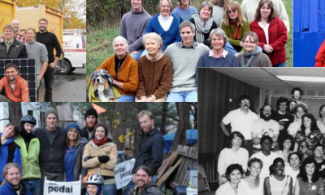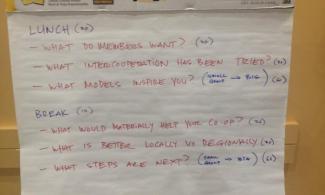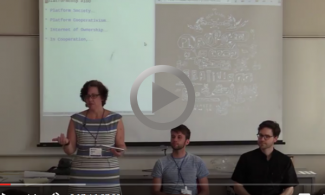Truthout recently ran a fascinating interview, Rick Wolff, a usual interviewee, interviewing Laura Flanders, a usual interviewer. It covers a lot of territory, but the last question Wolff asked Flanders to give her long view of what is going on now in the US. It was a highly unusual question, and she gave a rich response. Here it is, with Wolff’s part in italics:
Journalists like you are in a particularly good position. You're moving around all the time. You're shifting your attention from this to that. You're like a scanner looking across the society watching all the things that blow up. And over time, you get a sense of what's happening that isn't easily replicated by anybody else. So I want our listeners and viewers to get the benefit. Tell us - and I know this is an enormous question - what is happening in the United States? How do you see, given your years of covering so much in this country, and don't gloss over and don't sugarcoat it. Tell us, what do you think is happening from your perspective.
Well first off, it's that extraordinary opportunity to do the kind of work that you just described that makes what I do so great, fundraising notwithstanding. It has been an extraordinary privilege to be able to cover the Pittston strike that happened in 1989 as I did when I was 20-something and go back all these years later and follow up. I think something really interesting is happening, and your work points at this. We've had US economy 1.0. You can say the craft economy people doing their local craft and hands-on work, people producing a shoe, a gatepost [things]. And then we had industrial capitalism. US economy 2.0, if you like: industry…workers signed up with a boss and expected to be with that boss 'til [they reached age] 66.
We now live in an economy where workers can work on a Monday for a retail store, on a Wednesday for a restaurant and on a Friday, maybe, I don't know, picking through waste metal at a recycling dump. That worker, in the course of a week, can work for three different employers or none and maybe on the side have a little Internet business or a barter business doing braiding and baby-sitting for their family or their neighbors' kids.
Workers, in a sense as I'm telling this story, are returning to the kind of individual life experience that the old crafts person had in the 1760s, but this time with a very different context. And there is good and bad to it in the same way there is good and bad to the Internet. Sure we don't have the [mass, daily] water-cooler conversations prompted by [primetime] network television. Instead we have a superfluity of media outlets. Nobody is talking about the same stuff. So, too, at work, we are losing the power of the big union; we're losing the security that comes with that kind of institution. We're having to look at one another and having to decide how we can get together to cooperate to preserve some rights and to secure some place on this planet.
I think that's what we're seeing with the growth of these new worker organizations - the restaurant workers, the domestic workers, the fast-food workers, car-wash workers - I think the old unions are going to be looking around and saying, "What is it here that we have yet to understand. What do we have to learn?" And that speaks to the diversity that exists in this country, because, let's face it, everybody did not have those "secure" jobs. Everybody did not have that security. Even in the craft era, craft [guilds and unions] viciously maintained their exclusivity (keeping out the Irish, the woman, the enslaved person or the immigrant.) Today more and more of us are in that immigrant boat as we migrate from job to job day after day. Maybe there is help there as well as desperation. I certainly think we're going to see change on some basic things. No longer can your health insurance be attached to your job, for example; it makes no sense.
So I think it's like a crisis and opportunity like that famous Chinese character.
I would add that - just because you provoked it, in the best sense of the term - that we have to face the fact that there are two options. There might be a reconstitution of a new labor movement that sees these new conditions just as you described them, as a challenge that can mobilize new forms of organization that can provide people with decent livelihoods, decent job situations; education for their children and so on. That's one option that may happen and I sure hope so. But the other one is that the old industrial world - North America, Europe, Japan - is simply being abandoned by the capitalists [who are] moving production to where it is cheap, where there isn't any environmental control, where they are freer to do what they want and saying to the old parts of the world (including the United States) "Make it worth our while not to leave."
And what that means is, recreate in Cincinnati the conditions of Bangladesh, recreate in Chicago what you have in China. It really is a stark choice between these two directions, and everything will depend on whether the mass of the American people rise to this situation or they don't…
One little response to that - and you can again say that it's Pollyannaish - but I do think the US media terrifies Americans about everywhere else: the horror that is Greece, the horror that is Italy. Go to Italy, go to Greece; they're in economic crisis today. But they're in… a fight about expectations that we have yet to even embrace in this country.
Or imagine.
[Namely] The expectation of a vacation; the expectation of a workday that ends; and expectation of time to eat, at leisure with your friends and family, food that actually has a flavor that you can taste.
The lifestyle of many of these places - even the poor communities that we're told are so terrifying - is something I think a lot of Americans kind of miss. The hours Americans are working far outpace anything that's typical in the countries that I just mentioned… The hours Americans work are in a league of their own and it's killing us.
I think a massive transition is incredibly uncomfortable and there isn't a hunky-dory, rosy, local solution out there. But could we do with a reconsidering of the lifestyle that has been sold to us by consumerism and corporate pressure? I think so, and we might find things we like in the mess.
I think so. I think that's a good response, but those issues are coming to a head in this society. The statistic I sometimes mention, but it's the OECD, the same institution, indicates that the American people work, do more hours of paid labor per year than any other working class than any other country on this planet. So there is the proof. We are working 26 jobs. Everyone in a household is working. We barely have households left. Twenty years ago, the standard sitcom had a family with father with a tie and a jacket coming home from work, the mother at the home taking care of the kids and cooking. All of that's gone. Now we have sitcoms in which everybody is working and nobody gets along with anybody else and we all think it's funny because it gives us relief from our own situation.
In the US one in four of us [24 percent] of us work at low paying jobs - in Greece it's 13.5 percent.
Thank you Laura, as always I appreciate it.
Read the whole interview at http://www.truth-out.org/news/item/17456-the-choices-are-stark-richard-wolff-interviews-laura-flanders





Add new comment